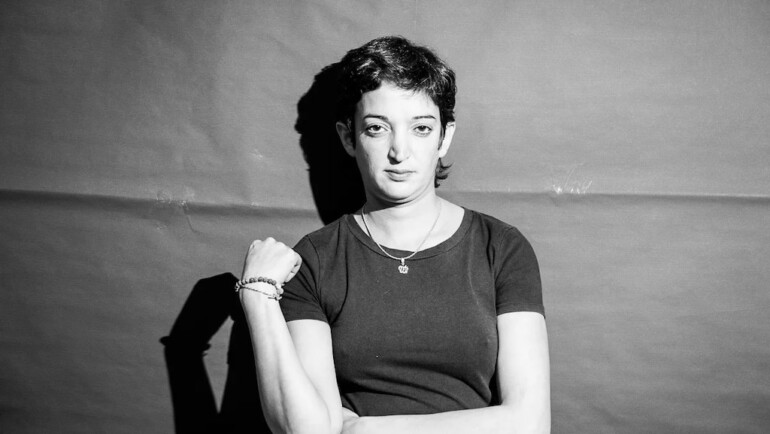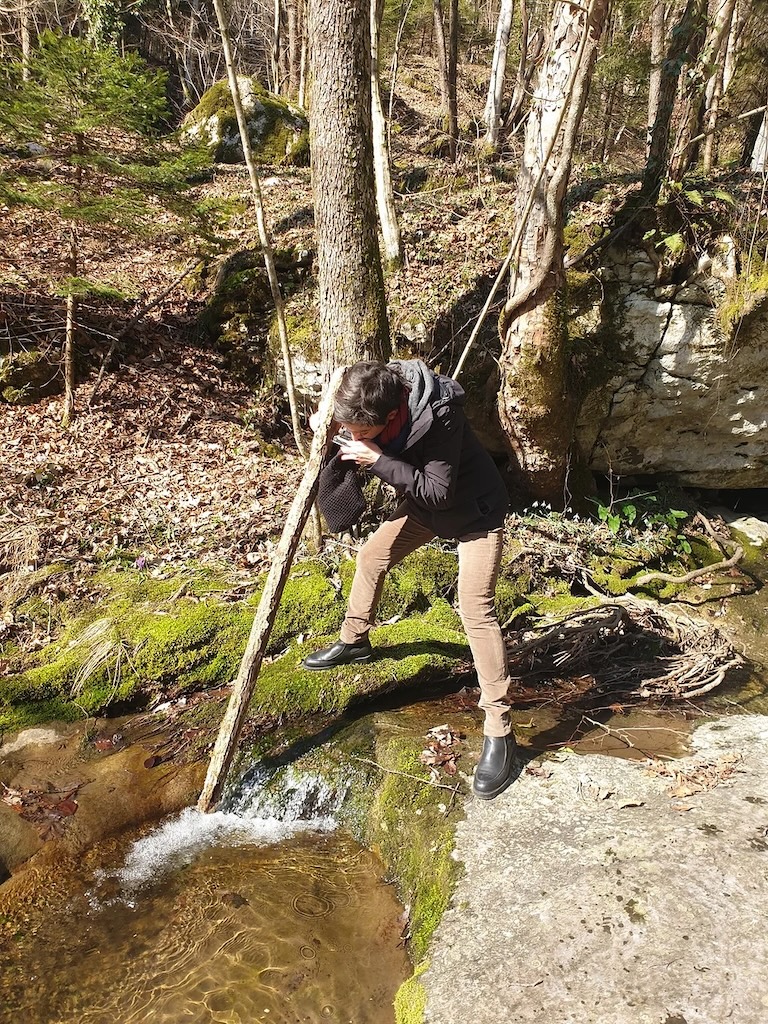
It’s not easy to schedule an interview with Zahra Mani. The composer, curator, and cultural advocate is busy – not just performing electroacoustic concerts, but also managing the Klanghaus Untergreith in Styria with Mia Zabelka and attending to her duties as vice president of the European Composer & Songwriter Alliance, a Brussels-based advocacy organization. Christoph Benkeser spoke to Mani about what that job entails and why she won’t be doing it forever, about her artistic role models, the composer Pauline Oliveros, and outer space.
Do you know how much time you spent in trains in 2023?
Zahra Mani: No idea. I was in London, Brussels, and Morocco – but even just counting the time I spent traveling between Carinthia, Styria, and Vienna, I lose track.
You’ve been an artist for a long time, you’re a curator, and you’ve also been vice-president of the European Composer and Songwriter Alliance (ECSA) since 2022.
Zahra Mani: It’s a lot, but the different jobs enrich each other. I’m particularly interested in some of the work we do at the ECSA – issues like cultural diversity, fair pay, and fair practice. I can compare how things work at the national level in Austria with the regional level, in Styria and Carinthia, and how it is at the European level – I see what’s going on. And where things work better. For instance, every organization that receives public money in France has to have a trained ombudsperson for personal conduct. That’s…
…something no one talks about in Austria.
Zahra Mani: Yes, it seems like some areas – like gender fairness and personal conduct – are more difficult to discuss here than elsewhere in Europe. Gender issues are just starting to be dealt with here, at the national and regional levels – our curatorial work at Klanghaus Untergreith comes to mind; we actively deal with these issues and provide a role model.
What areas of Austrian cultural policy do you see positively in the international context?
Zahra Mani: Austria has been a leader in fair pay; the guidelines were there in Austria earlier than in other countries, and the discussions were more public.
“Working at the European level, I constantly see how important we are economically”
You work at both the regional and the European level – how do those areas influence one another?
Zahra Mani: Before the ESCA, I never thought much about streaming, for instance – partially because, as a composer, it doesn’t really affect me much. But the collective experience of fighting for something, the solidarity – they have an effect on my role as vice president, and then there’s the economic importance of it. My advocacy work has made me more courageous.
What do you mean?
Zahra Mani: In Austria, you’re always a petitioner, always dependent on other people’s opinions. The question is: what is art and culture worth? Working at the European level, I constantly see how important [artists] are economically – we generate whole economic sectors and indirect profitability. I feel a lot better in that position than asking for favors. There are a lot of initiatives and papers on the status of artists; the problem is, the European Union isn’t responsible because it doesn’t mandate a minimum wage for artists. Still, it can make policy recommendations that influence the discussion at the national level.
So the EU is aware of the ECSA’s positions?
Zahra Mani: Very – a member of the EU Parliament is advocating for streaming reform [update: the European Parliament recently approved a non-binding resolution to regulate the streaming industry, ed.] , and we had significant input. Multiple positions bring multiple viewpoints to the table. For instance, last year I was at the Visa for Music Festival in Rabat, where I hosted a panel on streaming. I found the African input really valuable – musicians on that continent feel exploited, but instead of being resigned to it, they’re establishing their own streaming platforms or working on other solutions.
How well have you managed to balance your artistic work with your political work?
Zahra Mani: I kind of stumbled into working with the ECSA; the first time was at a meeting in Stockhom in 2019 – the idea at the time was that I get Austria back into the board of directors. When the lockdown started, I had the opportunity to conduct a lot of discussions at the regional level, so I gradually slid into the role and became vice-president in 2022. But I’ve set a deadline for myself. It’s something I have to do in my life, but at some point, it will be something I did.
“you immerse yourself in the essence of sound”
Let’s talk about your artistic work – you recently made the music for a radio play by Daniel Wisser.
Zahra Mani: Musical terra nova! And so great – the process, working together with the director, Ursula Scheidle…at the beginning it was almost like literary analysis; we analyzed the text creatively and went from there.
You’ve worked a lot in radio art in the past – how similar was it?
Zahra Mani: Less than I expected. The compositions are original, but they have a goal; they’re there to support the piece and Ursula’s idea. Radio art, on the other hand, is the water for my fish – it’s where I’m most comfortable, both in terms of composition and live performance, because I’m completely free. I can concentrate totally on the vision of a motive.
Does that vision depend on the improvisation?
Zahra Mani: Sometimes, but it’s more the output that’s dependent on the improvisation. Usually, I have visions, little pictures – for instance, I often imagine a high, elaborate sound coming from different directions. I haven’t managed to realize it yet; I carry it around with me…
Your quest for the eternal sound.
Zahra Mani: You do immerse yourself in the essence of sound – but because a single sound is so complex, the imagination is usually different from the result.
I imagine that as both sobering and intriguing – the search never ends.
Zahra Mani: There’s joy in openness and discovery. I always have to think of Pauline Oliveros, who spent her entire life experimenting with sound. Or Maryanne Amacher, who actually didn’t like music at all – just sound. Her approach was very serious, but she was one of the funniest people I ever met.

“I love music”
How do you see that – do you prefer sound to music?
Zahra Mani: No, I love music. I grew up with it. I listen to everything from Italian pop to experimental pieces; I love the variety. For me, it’s always about the ontological value of aesthetics – what’s beautiful? What’s ugly? How far can we go before it stops making sense?
Is that a question of the primordial sound, a pure sound?
Zahra Mani: It is. But the question also contains its opposite: the contaminated sound. When I think of the first, pure sound, I’m in space. I hear a crackling that’s just as precious as the crystalline songs of angels.
Are you worried that the serious political work could undermine your joyful approach to music?
Zahra Mani: On the contrary! I tend to enjoy music more; my exchange with other people contributes to it. But I know what you mean: some time ago, when I started learning about harmony, I was concerned that I would never be able to hear a piece innocently again, without analyzing it. And I can’t – but that analysis enriches my approach. To music…but to my political work, as well.
Christoph Benkeser, translated and adapted from the German original by Philip Yaeger.
